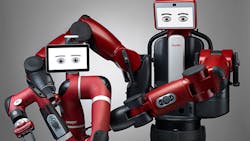Robots will not fill all our jobs, though they will fill some, especially in China, where the labor force is relatively stagnant and automation is as hot as any factory conversation topic. As that robotic workforce increases, some American companies will be prepared to meet what should be incredible demand.
Rethink Robotics is one of those companies. Headquartered in Boston, the company manufactures collaborative robots – Baxter is the world’s first two-armed collaborative robot, while its newer Sawyer is equipped with a single arm to fit in smaller workspaces – and has started to branch its offices beyond the United States and Europe, including a new office that opened earlier this year in Taipei.
Rethink collaborated with the nonprofit Epoch Foundation to open the office at the Garage+ Incubation Center in Taipei. The company has planned for the expansion for close to a year, chief product and marketing officer Jim Lawton said, and is “in the process of signing significant agreements with companies in China and Japan” to test and distribute Sawyer.
“We expect a significant portion of volume for Sawyer will be in China,” Lawton said, “and we plan to start shipping Baxter into China” in September.
The stagnant workforce and projected increase in automation during the next five to 10 years in China and the surrounding region are some of the biggest reasons robotics companies are bullish on China, and they have Lawton excited. So does the area’s general enthusiasm for the evolving technology.
“The Chinese are aggressive,” Lawton said, “even more so than our customers here. There’s a sense of urgency, and they’re pursuing this very fast.
“This is probably overstating this a little bit, but there’s a certain scrappiness in their approach. Just an example: When we had Sawyer running some of the tasks here for Chinese manufacturers, we had ongoing conversations, showing videos, and a lot of the feedback was along the lines of, ‘Great. When I can get a robot like this?’ ‘Well, our research isn’t done. We’re still working on control systems and that kind of stuff.’ ‘No, no, this is good enough. Let’s go.’
“They’re putting money into it, they’re putting significant political backing into it. The country is in pain from labor shortages, and they’re trying to navigate it in the short-term, but there’s also a perceived opportunity for them to lead the next wave of manufacturing.”
Rethink has filled all orders for its 2015 production, Lawton said, and is well into filling orders for 2016, too – domestically, in Europe, in and around China, and soon in Mexico, too, where, the company plans to start sales later this year.
China and the rest of the region probably has the biggest potential among those markets. The information and communications technology supply chain there is “so well-developed here that we believe startups and businesses expanding to Asia with a base in Taiwan will have a competitive edge when accelerating their operations, which, in turn, will stimulate the technology scene in Taiwan," said Josephine Chao, vice president of Epoch Foundation. "Companies that emphasize practical innovation, machine learning and advances in manufacturing automation will affect the future of our industrial society.”
About the Author
Matt LaWell
Staff Writer
Staff writer Matt LaWell explores news in manufacturing technology, covering the trends and developments in automation, robotics, digital tools and emerging technologies. He also reports on the best practices of the most successful high tech companies, including computer, electronics, and industrial machinery and equipment manufacturers.
Matt joined IndustryWeek in 2015 after six years at newspapers and magazines in West Virginia, North Carolina and Ohio, a season on the road with his wife writing about America and minor league baseball, and three years running a small business. He received his bachelor's degree in magazine journalism from Ohio University.
